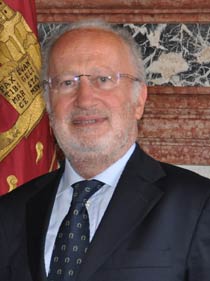Related Research Articles

The Group of Eight (G8) was an inter-governmental political forum from 1997 until 2014. It had formed from incorporating the country of Russia into the Group of Seven, or G7, and returned to its previous name after Russia was removed in 2014.

Romano Antonio Prodi is an Italian politician, economist, academic, senior civil servant, and business executive who served as the tenth president of the European Commission from 1999 to 2004. He served twice as Prime Minister of Italy, first from 18 May 1996 to 21 October 1998, and then from 17 May 2006 to 8 May 2008. Prodi is considered the founder of the Italian centre-left and one of the most prominent and iconic figures of the so-called Second Republic. He is often nicknamed Il Professore due to his academic career.
The following outline is provided as an overview and topical guide to green politics, a political ideology that aims for the creation of an ecologically sustainable society rooted in environmentalism, social liberalism, and grassroots democracy. It began taking shape in the western world in the 1970s; since then Green parties have developed and established themselves in many countries across the globe, and have achieved some electoral success.

Forza Italia was a centre-right political party in Italy with liberal-conservative, Christian-democratic, liberal, social-democratic and populist tendencies. Its leader was Silvio Berlusconi, who served as Prime Minister of Italy four times.

The Union of the Centre, whose complete name is "Union of Christian and Centre Democrats", is a Christian-democratic political party in Italy. Lorenzo Cesa is the party's current secretary; Pier Ferdinando Casini was for years the most recognisable figure and de facto leader of the party, before eventually distancing from it in 2016. The UdC is a member of the European People's Party (EPP) and the Centrist Democrat International (CDI), of which Casini was president from 2004 to 2015.
Liberalism and radicalism have played a role in the political history of Italy since the country's unification, started in 1861 and largely completed in 1871, and currently influence several leading political parties.

Renato Brunetta is an Italian economist and politician.

The Italian Socialist Party was a socialist and later social-democratic political party in Italy, whose history stretched for longer than a century, making it one of the longest-living parties of the country.

The People of Freedom was a centre-right political party in Italy. The PdL, launched by Silvio Berlusconi on 18 November 2007, was initially a federation of political parties, notably including Forza Italia and National Alliance, which participated as a joint election list in the 2008 general election. The federation was later transformed into a party during a party congress on 27–29 March 2009. The party's leading members included Angelino Alfano, Renato Schifani, Renato Brunetta, Roberto Formigoni, Maurizio Sacconi, Maurizio Gasparri, Mariastella Gelmini, Antonio Martino, Giancarlo Galan, Maurizio Lupi, Gaetano Quagliariello, Daniela Santanchè, Sandro Bondi, and Raffaele Fitto.
Liberal PD is a social-liberal faction within the Democratic Party (PD), a political party in Italy. The aim of the group is to promote liberal ideas within the party and elect liberal candidates. The faction, through the Italian Liberal Group, is an observer member of the Liberal International.

The Venetian People's Movement was a Christian-democratic and regionalist political party in Veneto, Italy. Its leader was Francesco Piccolo, long-time regional councillor and minister.

Renato Castellani was an Italian film director and screenwriter.
Reformism and Freedom is a "reformist" and mainly social-democratic think tank in Italy. ReL, whose president is Fabrizio Cicchitto, has been associated with The People of Freedom (PdL), a political party, until 2013 and is now close to New Centre-Right (NCD).

Giorgio Orsoni is an Italian lawyer, politician and a former mayor of Venice.
Liberamente is a liberal-centrist foundation and think-tank within Forza Italia (FI), a political party in Italy. Its main leader is Mariastella Gelmini and, previously, Franco Frattini.

Elisabetta Gardini is an Italian politician and TV presenter.
Antonio Preto was an Italian lawyer who was a civil servant of the European Parliament and from 2012 a member of the Italian regulator for Communications and the Audiovisual sector, Commissioner for Infrastructure and Networks. During his career in Brussels he dealt in particular with regulation issues and European policies concerning the right of establishment and the freedom to provide services, competition, e-commerce, copyright in the information society, consumer protection, industry and technological innovation. He also followed privatization and takeover beats of European important firms and EU controversy. Europe has been the common thread of his career. He participated in all the major debates on European integration and the future of the European Union. He closely followed the developments of the European Convention for a Constitutional Treaty, the enlargement process, the single market, the liberalization of the professions in Italy and Europe, the debate on the economical governance and the evolution of the professions' liberalization in Italy and Europe. Moreover, he also followed the interaction between the free market and the European construction.

Forza Italia is a centre-right political party in Italy, whose ideology includes elements of liberal conservatism, Christian democracy and liberalism. FI is a member of the European People's Party. Silvio Berlusconi is the party's leader and president, while Antonio Tajani functions as vice president and national coordinator. Other leading members include Elisabetta Casellati.

Craxism is a political ideology based on the thought of Italian socialist leader Bettino Craxi, who was Prime Minister of Italy during the 1980s. Craxism was the informal doctrine of the Italian Socialist Party from 1976 to 1994, the year when both the First Republic and the PSI itself were dissolved due to corruption scandals.
References
- ↑ "Chi siamo | FREEFOUNDATION". www.wicomwebspace.com. Archived from the original on 2011-07-18.